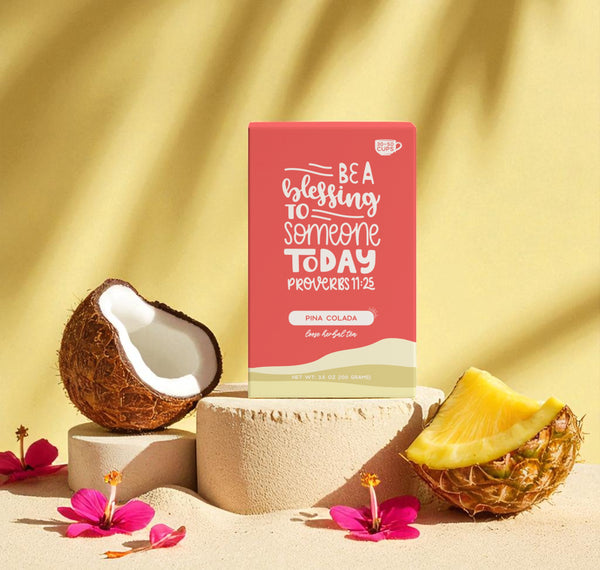The Spiritual Benefits of Hibiscus Tea: Finding Renewal in God's Crimson Gift
There's something almost sacred about the moment you pour hot water over dried hibiscus petals and watch the liquid transform into a deep, ruby red. As steam rises and the tart, cranberry-like aroma fills the air, you're witnessing a small miracle of creation—dried flowers blooming back to life, releasing their essence into something that nourishes both body and soul.
Perhaps you've discovered hibiscus tea recently, drawn to its vibrant color or its reputation as a caffeine-free alternative to your afternoon cup. Maybe you picked up a box at the store, intrigued by its exotic name and beautiful packaging. Whatever brought this remarkable flower into your life, you're about to discover that hibiscus tea offers far more than just a pleasant beverage—it's a gentle invitation to pause, reflect, and connect with the God who colors our world in breathtaking ways.
In our hurried culture, we often overlook the spiritual significance woven into the simple things around us. But when we slow down long enough to truly see, we find that even a cup of tea can become a doorway to deeper faith, renewed perspective, and quiet communion with our Creator.
The Deep Crimson of Renewal
When you hold a cup of freshly brewed hibiscus tea up to the light, its deep red hue is unmistakable—rich, vibrant, and almost jewel-like in its intensity. This isn't the pale pink of a weak brew or the muddy brown of over-steeped leaves. This is crimson in its purest form, a color that speaks to something profound in our hearts.
Throughout Scripture, the color red carries powerful symbolism of life, sacrifice, and renewal. When we see that deep red swirling in our cup, we're reminded of the precious blood that was shed for our redemption—not in a somber, heavy way, but with the joy that comes from understanding what that sacrifice accomplished.
"But now in Christ Jesus you who once were far away have been brought near by the blood of Christ." — Ephesians 2:13
Every sip of hibiscus tea can become a gentle reminder of how close we've been brought to the heart of God. The apostle Paul reminds us that what once separated us from our Creator has been removed through Christ's sacrifice. Just as the hibiscus flower gives its essence to create something beautiful and nourishing, Christ gave His life to create something beautiful in us—a new creation, renewed and restored.
The transformation that happens when dried hibiscus meets hot water mirrors the transformation that happens in our own lives when we encounter the living God. What appears lifeless and dormant suddenly bursts with color and purpose. What seemed ordinary becomes extraordinary. What felt dry and brittle becomes a source of refreshment.
Caffeine-Free Peace for Anxious Hearts
One of the most remarkable things about hibiscus tea is what it doesn't contain—caffeine. In a world that seems to run on stimulants and constant energy, hibiscus tea offers something different: natural calm without the crash, alertness without anxiety, and refreshment without restlessness.
For many of us, our relationship with caffeine reflects our relationship with the pace of modern life. We reach for another cup of coffee or energy drink because we feel we need to keep up, to stay alert, to maintain the frenetic pace that our culture demands. But what if God is inviting us to a different rhythm?
"Be still, and know that I am God; I will be exalted among the nations, I will be exalted in the earth." — Psalm 46:10
Hibiscus tea caffeine free doesn't mean hibiscus tea energy-free. Instead, it offers a different kind of vitality—one that comes from rest rather than stimulation, from peace rather than pressure. When we choose hibiscus tea over caffeinated alternatives, we're making a small but significant choice to step off the hamster wheel of constant stimulation and into a more sustainable rhythm of life.
This naturally caffeine-free quality makes hibiscus tea particularly wonderful for evening reflection and prayer. As the day winds down and our bodies naturally prepare for rest, a warm cup of hibiscus tea can become part of our transition from the busyness of day into the peace of evening communion with God.
The absence of caffeine also means we can enjoy hibiscus tea without the jitters, crashes, or sleep disruption that often come with caffeinated beverages. It's a reminder that God's gifts to us are perfectly designed—not to overstimulate or create dependency, but to nourish and refresh in exactly the right measure.
Heart Health and the Sacred Rhythm
The benefits of hibiscus tea extend far beyond its caffeine-free nature into remarkable support for our physical hearts. Research has shown that regular consumption of hibiscus tea may help support healthy blood pressure, improve circulation, and provide antioxidants that protect our cardiovascular system. But as we consider these physical benefits, we're invited to reflect on the deeper spiritual parallels.
Our physical heart beats approximately 100,000 times each day, pumping life-giving blood to every cell in our body without our conscious thought or effort. It's a miracle we often take for granted—this faithful muscle that sustains our very existence through its consistent, rhythmic work.
"Above all else, guard your heart, for everything you do flows from it." — Proverbs 4:23
Just as hibiscus tea supports our physical heart health, our time in prayer and Scripture nourishes our spiritual heart. The antioxidants in hibiscus tea fight against the damage caused by free radicals in our body, much like the truth of God's Word fights against the lies and anxieties that would damage our spiritual well-being.
When we sip hibiscus tea mindfully, we can use those moments to check in with both our physical and spiritual heart health. How are we feeling? What stress are we carrying? Where do we need God's peace to flow more freely through the chambers of our hearts?
The gentle, ongoing support that hibiscus tea provides for our cardiovascular system reminds us that God's care for us isn't just for crisis moments—it's steady, consistent, and designed to sustain us through all the ordinary moments of life.
Antioxidants and Spiritual Protection
Among the many benefits of hibiscus tea, its high antioxidant content stands out as particularly remarkable. These powerful compounds work quietly within our bodies, neutralizing harmful free radicals and protecting our cells from damage. It's invisible work—we can't see or feel the antioxidants doing their job, but their effects are real and significant.
This invisible protection mirrors the spiritual protection we receive through prayer, Scripture, and our relationship with Christ. We may not see the attacks that are deflected or the harm that's prevented, but God's protective love surrounds us constantly.
"The name of the Lord is a fortified tower; the righteous run to it and are safe." — Proverbs 18:10
Just as we don't drink hibiscus tea only when we feel unhealthy, we shouldn't approach prayer and spiritual practices only during times of crisis. The antioxidants in hibiscus tea work best when consumed regularly, building up protective compounds in our system over time. Similarly, our spiritual defenses are strengthened through consistent, daily communion with God—not just emergency prayers during difficult seasons.
Every cup of hibiscus tea can remind us of God's faithful protection over our lives. As we taste its tart, refreshing flavor, we can give thanks for all the ways God shields us that we may never know about—the accidents that didn't happen, the illnesses that were prevented, the spiritual attacks that were turned away.
The deep red color of hibiscus tea serves as a visual reminder that we are covered by the blood of Christ, protected not by our own righteousness but by His perfect sacrifice. This protection doesn't make us invincible to all earthly troubles, but it does assure us that nothing can separate us from God's love or thwart His ultimate purposes for our lives.
Digestive Support and Spiritual Nourishment
Hibiscus tea has traditionally been used to support healthy digestion, helping our bodies process and absorb the nutrients from our food more effectively. This physical benefit opens up beautiful spiritual parallels about how we process and digest spiritual truth.
Just as our physical bodies need proper digestion to extract nutrients from food, our spirits need time and contemplation to properly digest the truths we encounter in Scripture and prayer. We live in a fast-food culture that extends to spiritual consumption—we want quick devotionals, instant inspiration, and immediate answers. But deep spiritual growth, like good digestion, takes time.
"Like newborn babies, crave pure spiritual milk, so that by it you may grow up in your salvation." — 1 Peter 2:2
When we sit quietly with a cup of hibiscus tea, we're creating space for both physical and spiritual digestion. The warm liquid soothes our physical digestive system while the quiet moments allow our hearts and minds to process the spiritual food we've been consuming through prayer, worship, and Scripture study.
The tart, complex flavor of hibiscus tea requires a moment of adjustment for many people. It's not immediately sweet like many modern beverages—it has depth, character, and sophistication that reveals itself gradually. This mirrors how spiritual maturity develops. The deeper truths of faith aren't always immediately palatable to our human nature, but as we grow in wisdom and experience, we learn to appreciate their richness and complexity.
Creating Sacred Space with Simple Rituals
The simple act of preparing hibiscus tea can become a meaningful ritual that creates sacred space in our day. The process itself invites mindfulness—measuring the dried flowers, heating the water to just the right temperature, watching the transformation as the petals release their essence into the water.
These small, intentional acts can serve as transitions from the busyness of daily life into moments of reflection and prayer. In our fast-paced world, we often underestimate the power of ritual and routine to anchor our souls and create rhythm in our spiritual lives.
"Seven times a day I praise you for your righteous laws." — Psalm 119:164
The psalmist understood the importance of punctuating our days with moments of worship and reflection. While we may not pray seven formal prayers each day, we can create small rituals—like preparing and enjoying hibiscus tea—that serve as gentle calls to remember God's presence throughout our day.
Consider establishing a hibiscus tea ritual that works for your schedule and lifestyle. Perhaps it's a morning cup as you read Scripture before the house wakes up. Maybe it's an afternoon tea break where you pause to pray for family and friends. Or it could be an evening cup as you journal and reflect on the day's blessings and challenges.
The key is intentionality. When we approach even simple activities like making tea with purpose and awareness, they become opportunities for spiritual connection and growth.
Final Thoughts
As we've explored together, hibiscus tea offers far more than just a caffeine-free alternative to our usual beverages. Its deep crimson color, health-supporting properties, and gentle nature create opportunities for spiritual reflection and connection with our Creator. The benefits of hibiscus tea extend beyond the physical into the realm of the spirit, where small rituals and mindful moments can become pathways to deeper faith and lasting peace.
Every time you brew a cup of hibiscus tea, you're participating in a small miracle of transformation—dried petals becoming liquid beauty, ordinary moments becoming sacred space, simple beverages becoming reminders of God's abundant love. In a world that often feels chaotic and overwhelming, hibiscus tea offers a gentle invitation to slow down, breathe deeply, and remember that we are held by a God who delights in both the grand gestures and the quiet moments of our lives.







